Das Olympische Bildungsmagazin
live aus Rio (9), Take that, Bach & Putin: IPC suspends the Russian Paralympic Committee
- Jens Weinreich
- 7. August 2016
- 18:25
- 23 Kommentare
Sir Philip Craven for IOC President!
— Andreas Selliaas (@aselliaas) August 7, 2016
BARRA DA TIJUCA. Owen Gibson hat schon Recht gehabt gestern im Guardian. Das Internationale Paralympische Komitee (IPC) unter dem britischen IOC-Mitglied Sir Philip Craven macht Ernst und suspendiert das Russische Paralympische Komitee. Die Paralympics im September werden demnach ohne Russland stattfinden.
Craven showing leadership Bach lacked „This is not about athletes cheating the system but the state run system that is cheating athletes“
— Owen Gibson (@owen_g) August 7, 2016
Das ist der Hammer. Zehn Wirkungstreffer. Putins Geschäftsfreund, der IOC-Bach, ist weiter angeknockt. IOC-Propagandachef Mark Adams verbreitete umgehend, der Unterschied zwischen IPC und IOC sei, dass das IPC oberstes Gremium für alls Sportarten ist – während das IOC mit 28 Sommersportarten (plus fünf Neuaufnahmen für Tokio) und sieben Wintersportverbänden zu tun hat. Aber das ist Nonsens. Wieder mal, ich wiederhole es und werde es tausendmal wiederholen: Das ist Propaganda. Denn das IOC hat die olympische Herrschaft. Einzig und allein. Was die Olympische Charta dazu hergibt, und was tausendmal wirkungsvoller ist als der Kompromiss, der mehr stinkt als sämtliche Lagunen, Rinnsale und Favelas von Rio, den das IOC gemacht hat, kann von keimem Gericht der Welt gekippt werden.
Results of the Sochi Paralympics. Russia won by a landslide, with 80 medals — 65 more than runner-up Germany. pic.twitter.com/nwxEf3MODt
— Rebecca R. Ruiz (@RebeccaRuiz) August 7, 2016
Gleich mehr dazu, vorerst nur einige Tweets und die komplette Mitteilung des IPC. Sensationelle Pressekonferenz mit Craven. Schreibe eine Analyse und melde mich danach wieder.
Sir Philip Craven is delivering a masterclass in ethics & transparency here. Very, very impressive. Big moment for Paralympic sport.
— Matt Slater (@mjshrimper) August 7, 2016
Just to clarify, unless Russia wins appeal (it has 21 days), NO Russian athletes at Paralympics. No IOC-style vetting process, no neutrals.
— Matt Slater (@mjshrimper) August 7, 2016
Die Erklärung, die Reden, Reaktionen und meine erste große Analyse:
The IPC suspends the Russian Paralympic Committee with immediate effect
The International Paralympic Committee (IPC) has suspended the Russian Paralympic Committee with immediate effect due to its inability to fulfil its IPC membership responsibilities and obligations, in particular its obligation to comply with the IPC Anti-Doping Code and the World Anti-Doping Code (to which it is also a signatory).
After evaluating all of the evidence before it, and allowing the Russian Paralympic Committee to present its case both in writing and in person, the IPC Governing Board unanimously determined that the Russian Paralympic Committee is unable to ensure compliance with and the enforcement of the IPC’s Anti-Doping Code and the World Anti-Doping Code within its own national jurisdiction. These obligations are a fundamental constitutional requirement for all National Paralympic Committees (NPCs), and are vital to the IPC’s ability to ensure fair competition and to provide a level playing field for all Para athletes around the world.
In line with the IPC’s Suspension Policy, the Russian Paralympic Committee now has 21 days (28 August) to appeal the decision.
The effect of the suspension is that the Russian Paralympic Committee loses all rights and privileges of IPC membership. In particular, a member is not entitled to be heard, except with respect to their suspension, or to vote at meetings of members, and/or to enter athletes in competitions sanctioned by the IPC, and/or to participate in IPC activities. Consequently, the Russian Paralympic Committee will not be able to enter its athletes in the Rio 2016 Paralympic Games.
Paralympics 2014, Sir Philip Craven, Wladimir Putin (Foto: President of Russia)
Sir Philip Craven, IPC President, said:
„This decision has placed a huge burden upon all our shoulders, but it’s a decision we’ve had to take in the best interests of the Paralympic Movement.
Ultimately, as the global governing body for the Paralympic Movement, it is our responsibility to ensure fair competition, so that athletes can have confidence that they are competing on a level playing field. This is vital to the integrity and credibility of Paralympic sport, and in order to achieve this it is fundamental that each member abides by the rules.
Since the publication of the McLaren Report on 18 July our priority has been to establish the full facts in respect of Para sport. A decision of this magnitude must be evidence based and not influenced by the many and varied views of other people or organisations outside of the IPC and the Paralympic Movement.
In particular, we have taken the necessary time to ask further questions of Professor McLaren and his investigation team, to await the results of samples undergoing further forensic examination and to invite the Russian Paralympic Committee to present its case to the IPC and enter into dialogue with the IPC Governing Board.
With the full facts to hand, we were deeply saddened to find that the State-sponsored doping programme that exists within Russian sport regrettably extends to Russian Para sport as well.
Tragically this situation is not about athletes cheating a system, but about a State-run system that is cheating the athletes. The doping culture that is polluting Russian sport stems from the Russian government and has now been uncovered in not one, but two independent reports commissioned by the World Anti-Doping Agency.
Our decision is driven by the need to hold our members accountable for their obligations. On the basis of the evidence we have, in the current environment our member the Russian Paralympic Committee cannot comply with the IPC’s Anti-Doping Code and the World Anti-Doping Code. Those obligations are crucial to the IPC’s guarantee of fair competition for all.
Paralympics 2014. (Foto: President of Russia)
I believe the Russian government has catastrophically failed its Para athletes. Their medals over morals mentality disgusts me. The complete corruption of the anti-doping system is contrary to the rules and strikes at the very heart of the spirit of Paralympic sport. It shows a blatant disregard for the health and well-being of athletes and, quite simply, has no place in Paralympic sport. Their thirst for glory at all costs has severely damaged the integrity and image of all sport, and has certainly resulted in a devastating outcome for the Russian Paralympic Committee and Para athletes.
I have deep sympathy for Russian Para athletes who will miss out on the Rio 2016 Paralympic Games. They are part of a broken system and we sincerely hope that the changes that need to happen, do happen. Russia has some top-quality athletes across all sports and we look forward to the day when we can welcome the Russian Paralympic Committee back as a member safe in the knowledge that it is fulfilling all its obligations in order to ensure a level playing field for all.“
Since opening suspension proceedings against the Russian Paralympic Committee on 22 July, the IPC has, among other things taken the following steps:
Wer vorgeführt wird wie Thomas Bach heute, müsste zurücktreten, hätte er Charakter. IPC und IOC ist wie Demokratie vs Mittelalter #Rio2016
— Jens Weinreich (@JensWeinreich) August 7, 2016
Step 1 – Further investigation of the “disappearing positive samples”
· The McLaren Report identified 35 samples related to Paralympic sport where a liaison person within the Moscow Laboratory notified the Deputy Minister of Sport Yury Nagornykh following a positive screen result. Following this notification, samples were marked either as QUARANTINE or SAVE. Such actions are a direct breach of both the World Anti-Doping Code and the IPC Anti-Doping Code.
· Following a request from the IPC on Monday 18 July, Professor McLaren provided the names of the 35 athletes associated with the 35 samples on Thursday 21 July, together with the dates the samples were provided, the possible substance the athletes tested positive for, the sample code numbers and whether the sample had been marked QUARANTINE or SAVE.
· On Saturday 6 August, the investigation team provided the IPC with an additional 10 samples, relating to nine athletes, which were part of the “disappearing positive” methodology. In total the IPC now has information on 45 samples relating to 44 athletes.
· From these data, the IPC determined in what sports the 44 athletes compete, with the exception of one individual that has not been identified yet.
· Our research revealed that 17 of the 45 samples originate from athletes who participate in sports that are either not on the Paralympic programme or whose international federations are not recognised by the IPC.
· This leaves 27 samples that are related to athletes in eight Para sports that are part of the current Paralympic sport programme. Five of the eight sports are summer sports whilst three are winter sports.
· Some of the Para sports associated with the 27 samples are ones that the IPC governs as an International Federation, whilst others are non-IPC sports that are governed by other International Federations.
· At least 11 of the 27 Para sport athlete samples were marked SAVE by the Moscow Laboratory. This means that positive samples from these Para athletes were subsequently reported as a negative, and the athletes faced no punishment.
· Professor McLaren believes, that as with all sports listed in the report, there are likely to be even more samples that were included in the “disappearing positive” methodology.
Paralympics 2014. (Foto: President of Russia)
Step 2 – Testing of 21 samples from the Sochi 2014 Paralympic Winter Games
· Although not directly referred to in the McLaren Report, the IPC now has evidence that the sample swapping regime that operated during the Sochi 2014 Olympic Winter Games in the Sochi laboratory was also in operation during the Sochi 2014 Paralympic Winter Games.
· In total, the IPC sent 21 samples from seven Russian athletes who competed at Sochi 2014 to London for further forensic examination. These samples were selected by the investigation team on an intelligence-led basis, together with a small number of additional samples chosen by the IPC.
· Upon receipt, the laboratory found that two samples had sediment in the cap which meant they could not be tested, leaving 19 samples that could be properly examined.
· Of the 19 samples, forensic examination established that the caps of 18 samples showed scratches and marks that were consistent with those found on the Sochi 2014 Olympic Winter Games samples.
· DNA analysis confirms the clean urine which was swapped comes from the same athlete.
· According to the McLaren investigation team, the bottles examined are a representative sample that indicates Paralympic athletes were included in the broader doping scheme. They believe that further investigations will uncover many more samples involved in this programme.
· Now that these data have corroborated the claim that this State directed scheme has involved Russian Paralympic athletes, the IPC plans to reanalyse every Russian sample from the Sochi 2014 Paralympic Games in the coming months.
· The IPC is also seeking further advice from the IPC Anti-Doping Committee and WADA on what measures can be taken to address the athletes associated with these samples, including results management.
Step 3 – Meeting with the Russian Paralympic Committee
· In accordance with the IPC’s Suspension Policy, the IPC provided sufficient time to allow the Russian Paralympic Committee to present their case to the IPC.
· On Friday 29 July, the Russian Paralympic Committee provided written submissions to the IPC Governing Board for consideration.
· On Wednesday 3 August, a seven-person delegation from the Russian Paralympic Committee visited the IPC’s headquarters in Bonn, Germany, to additionally present their arguments in person before the IPC Governing Board.
· Twelve of the IPC Governing Board members – six of which are Paralympians – participated in the three-hour meeting which also provided an opportunity for both parties to enter dialogue and ask and answer questions of each other.
· After this meeting, the IPC Governing Board convened for a further two hours to discuss the evidence it had before it.
· Questions that could not be fully answered in the meeting were responded to within 24 hours in writing.
Slot redistribution and next steps
Following the decision, the IPC is now working with the relevant International Federations to determine how the 267 slots Russian athletes had secured across 18 sports for Rio 2016 can potentially be redistributed to other NPCs. A final decision will not be taken on redistributing these slots until after the outcome of any potential appeal by the Russian Paralympic Committee is decided.
The IPC also will now begin developing the steps the Russian Paralympic Committee will need to take to meet its membership obligations. By rule, the Russian Paralympic Committee’s suspension will be lifted immediately following the Governing Board’s determination that the member is once again able to meet its membership obligations in full.
Das IPC zeigt auch, wie man derlei Entscheidungen aufbereitet und präsentiert.
- Speech by IPC President Sir Philip Craven
- Speech by IPC Athletes’ Council Chairperson Todd Nicholson
Todd Nicholson ist übrigens #IPC Athletensprecher. Bachs #IOC-Vorstand musste die Athleten übergehen. @ClaudiaBokel #doping #Rus
— Grit Hartmann (@Grit_Hartmann) August 7, 2016
16.18 Uhr: Meine erste Analyse nach einigen hektischen Gesprächen und Chats und ohne alles gründlich gelesen zu haben. Das mache ich jetzt. (So ist das oft im real existierenden Journalismus, da schreibt man „Analysen“ über mitunter hunderte Seiten Juristenenglisch und muss fertig sein, bevor man auch nur eine Seite richtig gelesen hat. Das wird sich nie ändern. Und oft wird es auch nicht besser, wenn man so was nach drei Tagen formuliert. Der erste Eindruck, die ersten Auffälligkeiten, verbunden mit Hintergründen, die man erfragt und versucht zu skizzieren … das hat auch was Spannendes, das macht den Reiz aus, trotz aller Unvollkommenheit.)
Einen Auftritt wie diesen von Sir Philip Craven hatte die olympische Welt noch nicht gesehen. Der Brite, Präsident des Internationalen Paralympischen Komitees (IPC), lieferte am Sonntag in Barra da Tijuca ein kleines Meisterstück an Transparenz und Konsequenz, das die Branche weiter erschüttert. Das IPC suspendierte das Russische Paralympische Komitee (RPC), somit können die Russen nach jetzigem Stand nicht an den Paralympischen Spielen im September in Rio de Janeiro teilnehmen. Ihnen bleiben drei Wochen Zeit, um Einspruch zu erheben. Für das bestens dokumentierte russische Staatsdopingsystem und den organisierten Betrug an paralympischen Sportlern anderer Nationen empfinde er „Ekel“, sagte Sir Philip Craven und machte die Dimension klar.
Fairplay ist das Fundament des Sports. Wenn wir damit nachlassen, sind wir erledigt.
Die Entscheidung des IPC-Verwaltungsrats, die am Samstag bereits im Guardian durchgesickert war, da vom IPC aber noch dementiert wurde, ist ein Schlag ins Gesicht des deutschen IOC-Präsidenten Thomas Bach.
So und kaum anders wird es in Medien weltweit kommentiert.
Sir Philip Craven gehört selbst dem Internationalen Olympischen Komitee an, er hat sich dort bislang nie als Held hervorgetan, keine bahnbrechende Initiative ging von ihm aus. Er hat auch am Dienstag kein Widerwort gegeben, als Bach auf der IOC-Session Unterstützung für die von ihm eingefädelten und weltweit erbittert diskutierten Beschlüsse einforderte, Russlands NOK trotz erwiesenen kriminellen Staatsdopings nicht zu suspendieren und den Großteil des russischen Teams in Rio zuzulassen.
Aber was Craven nun präsentierte und in beeindruckender Weise begründete, sucht seinesgleichen.
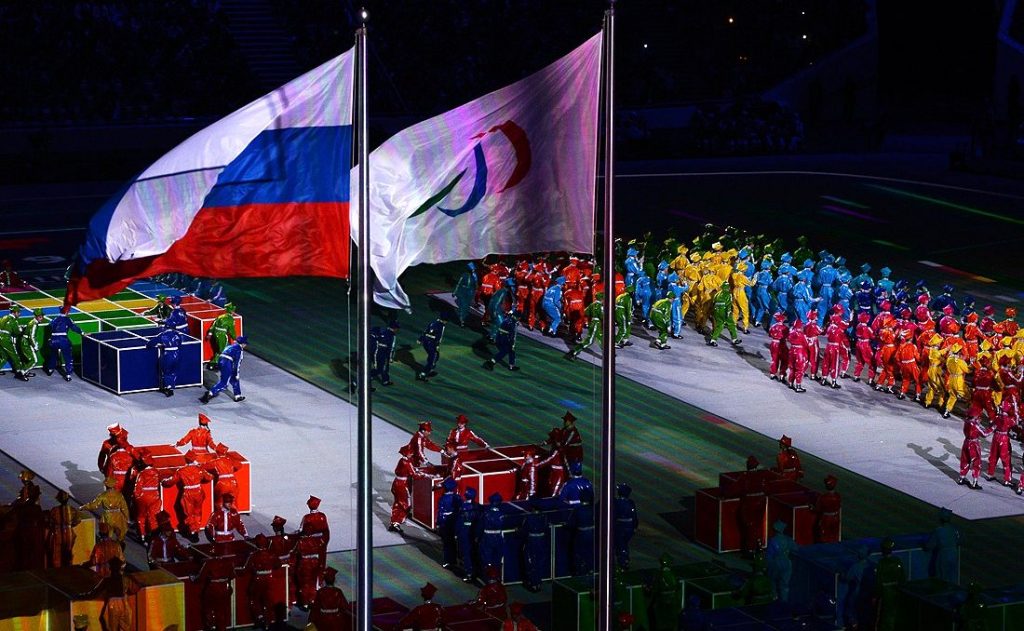
Paralympics 2014. (Foto: President of Russia)
Das IPC bewertet die in mehreren Untersuchungsberichten der WADA präsentierten Fakten kolossal anders als das IOC.
- Das IPC suspendiert das RPC als Bestandteil des Staatsdopingsystems sofort – während Bachs IOC das russische NOK für angebliche Aufklärungsarbeit und Kooperationsbereitschaft mehrfach lobte.
- Das IPC zieht Konsequenzen daraus, dass Russland schon im November 2015 als non compliant zum Welt-Antidoping-Code der WADA eingestuft wurde – während Bachs IOC daraus keine Schlussfolgerungen zieht.
- Das IPC hält sich an sein Regelwerk – während Bachs IOC die scharfen und juristisch unangreifbaren Optionen der Olympischen Charta völlig negiert hat. (Nochmal: Bitte Suchfunktion benutzen, welche Optionen das sind, oder besser: welche Pflicht Bach gehabt hätte, die Charta zu verfolgen, habe ich mehrfach dargelegt.)
- Das IPC hat sofort mit dem WADA-Sonderermittler Richard McLaren kooperiert, sich beraten und ergänzende Auskünfte eingeholt – während Bach den MacLaren-Bericht demonstrativ nur noch als „vorläufig“ bezeichnet und davon spricht, nach weiteren Ermittlungen und nach Vorlage eines abschließenden McLaren-Berichts neu entscheiden zu wollen, während Bach also auch hier auf Zeit spielt.
- Das IPC stellt den Betrug der Russen am Rest der Welt bei den Sotschi-Paralympics und damit jene Athleten in den Vordergrund, die als sauber gelten müssen – das IOC unter Thomas Bach konzentrierte sich im Grunde nur auf russische Sportler, denen man Schlupflöcher bot.
Die Aufzählung ließe sich beliebig verlängern. Wir können gemeinsam sicher leicht viele Punkte anfügen.
Schließlich offenbart auch die Präsentation der IPC-Entscheidung einen gewaltigen Unterschied, wie Tag und Nacht, wie Demokratie und Mittelalter:
Craven trat aufs Podium, hielt eine beeindruckende Rede, legte einen ausführlichen Beschluss vor und beantwortete Fragen über Fragen. Thomas Bach dagegen lud am Donnerstagabend seine olympische Familie zum President’s Dinner, als der Weltöffentlichkeit in einer dürren Meldung ohne jegliche ergänzende Fakten die Mitteilung gemacht wurde, dass rund 270 Russen in Rio teilnehmen dürfen.
Die Behauptung des IOC-Kommunikationsdirektors Mark Adams, das IPC sei in einer besseren Position, weil es allein für den paralympischen Sport zuständig sei, wogegen das IOC mit den Sport-Fachverbänden verhandeln müsse, ist auch nichts als pure Propaganda: Denn das IOC ist gemäß seiner Olympischen Charta sogar in einer besseren Position als das IPC, finanziell ohnehin, das IOC hat alle Rechte und die Alleinbefugnis, ein russisches NOK zu sperren.
Die Reaktionen russischer Sportfunktionäre auf ihren Sieg mit Bachs tatkräftiger Unterstützung könnten die Haltung des IPC beeinflusst haben, knallharte Maßnahmen zu ergreifen. So hatte das IOC-Mitglied Alexander Popow, der ehemalige Wunderschwimmer, Journalisten lautstark empfohlen, er möge es gar nicht, „wenn andere ihre Nasen in unsere internen Angelegenheiten stecken“. IPC-Athletensprecher Todd Nicholson aus Kanada sah sich in sozialen Medien enormen Druck russischer Seite ausgesetzt. Auch Nicholson begründete die Sperre des RPC in einer beeindruckenden Rede.
Und darin liegt noch ein Unterschied zum IOC.
Dort hatte die Chefin der Athletenkommission, Claudia Bokel, den Rückhalt tausender Elitesportler aus allen Kontinenten. Sie kämpfte gemeinsam mit der Athletensprecherin der WADA, Beckie Scott aus Kanada, und wurde von IOC-Mitgliedern angefeindet. Chancenlos war sie dann auf dem entscheidenden Meeting des IOC-Exekutivkomitees am 24. Juli. Bokel enthielt sich der Stimme. Alle anderen stimmten mit Bach.
IOC-Mitglieder und Bach-Getreue wie Patrick Hickey aus Irland und Scheich Ahmad Al-Fahad Al-Sabah aus Kuwait, dessen NOK vom IOC suspendiert ist, hatten mit hinterlistigen Aktionen versucht, die Allianz der Athletensprecher zu brechen: Die Athletenkomitees aus Europa und Asien, wo Hickey und Scheich Ahmad die NOK-Kontinentalverbände leiten, unterstützten in fragwürdigen Resolutionen die Haltung der IOC-Führung.
Im IPC aber kamen Athleten zu Wort. Denn sie sind es, die von den russischen Staatsdopern in historischem Ausmaß betrogen wurden. Die Dominanz der Russen bei den Paralympics 2014 in Sotschi war ja ungleich größer als der Vorsprung Russlands in der Nationenwertung der Olympischen Winterspiele, wo positive Dopingproben von mindestens fünfzehn Medaillengewinnern unter Mitwirkung des Inlands-Geheimdienstes FSB und unter Aufsicht des Sportministeriums ausgetauscht wurden. Bei den Paralympics organisierten die russischen Gastgeber, so muss man es bezeichnen, insgesamt 80 Medaillen (30 Gold, 28 Silber, 22 Bronze). Deutschland kam in der Nationenwertung auf Rang zwei (15 Medaillen, davon 9 Gold) vor Kanada (16 Plaketten, 7 Gold). Diese Ergebnislisten werden komplett umgeschrieben.
Paralympische Sportler haben sich in den vergangenen Wochen mehrheitlich deutlich zu einer Sperre der Russen bekannt. Der Deutsche Behindertensportverband DBS unterstützte die IPC-Entscheidung am Sonntag sofort und unmissverständlich auf ganzer Linie.
Wichtiges Signal für Anti-Doping-Kampf
Der Deutsche Behindertensportverband (DBS) hat die Entscheidung des Internationalen Paralympischen Komitees (IPC), das Nationale Paralympische Komitee Russland (NPC Russland) für die Paralympischen Spiele in Rio de Janeiro zu suspendieren, begrüßt und reagiert mit Zustimmung auf diesen Beschluss. Das IPC hatte als Folge der Erkenntnisse aus dem McLaren-Report – unter anderem wurde von 35 verschwundenen Dopingproben russischer Paralympics-Sportler berichtet – ein Suspendierungsverfahren eingeleitet. Nun wurde im Rahmen einer Pressekonferenz in Rio de Janeiro der Ausschluss des NPC Russland verkündet.
DBS-Präsident Friedhelm Julius Beucher und Chef de Mission Dr. Karl Quade sind mit der Null-Toleranz-Politik des IPC in der Dopingbekämpfung ausdrücklich einverstanden: „Die aufgedeckten Dopingpraktiken in Russland stellen im Behindertensport eine neue Dimension dar. Folgerichtig begrüßen wir die klare, unmissverständliche und mutige Entscheidung des IPC. Es handelt sich um ein wichtiges Signal hin zu einem konsequenten Anti-Doping-Kampf – im Sinne des Fair-Play-Gedankens im Sport ist diese harte Linie der völlig richtige Weg. Im Gegensatz zum IOC hat der Paralympische Sport diese historische Chance wahrgenommen, von der wir uns nachhaltige Auswirkungen auf gerechte Wettkämpfe erhoffen“, erklären Beucher und Quade.
Dagegen hatte die allgewaltige Führung des Deutschen Olympischen Sportbundes (DOSB), Präsident Alfons Hörmann und der Vorstandsvorsitzende Michael Vesper, alles unternommen, um die Linie des einstigen DOSB-Primus Thomas Bach durchzusetzen. Deutsche Sportler wie Olympiasieger Robert Harting wurden verbal schon mal gemaßregelt. In Rio behauptete Vesper nun, es gelte Meinungsfreiheit im deutschen Team.
Neben dem Einsatz der Sportler, der vom IPC-Verwaltungsrat goutiert wurde, anders als im IOC, lässt sich ein weiterer Grund ausmachen, der zur Aufsehen erregenden Entscheidung geführt haben. Der Druck britischer Medien auf Philip Craven war groß, sich den Fakten zum gigantischen Sportbetrug der russischen Regierung nicht zu verschließen und Konsequenzen zu ziehen. Dieser Druck hatte zuletzt bereits Lord Sebastian Coe, den Präsidenten des Leichtathletik-Weltverbandes (IAAF) zu erstaunlichen Rettungsaktionen verleitet, ebenso Sir Craig Reedie, den Präsidenten der Welt-Antidoping-Agentur (WADA).
Wir reden hier nicht von politischem Druck, sondern davon, atemraubende Beweise krimineller Machenschaften zu würdigen. Mitunter werden demokratische Wert in Britannien noch mit Verve verteidigt. Reedie, Coe und Craven haben das begriffen und es nicht gewagt, die Beweise abzuschwächen und so lange nach Lücken im Regelwerk zu suchen, bis die Sportarmee des Wladimir Putin befriedet werden konnte.
Dabei hat ja im Winter 2014 nicht nur Thomas Bach im Beisein von Wladimir Putin die Sotschi-Spiele als „Spiele der Athleten“ gepriesen, auch Philip Craven fand nach den Paralympics große Worte und sprach von den besten paralympischen Winterspielen aller Zeiten. Seine Sicht auf den schönen Schein der Sotschi-Bilder hat sich angesichts der gewaltigen Faktenlage geändert.
17.37 Uhr: Das Statement der WADA, kurz und knackig. Der Worte sind genug gewechselt.
WADA Statement on IPC Decision
WADA has taken note of the decision announced today by the International Paralympic Committee (IPC) relating to the membership status of the National Paralympic Committee of Russia (NPC of Russia) ahead of the Rio 2016 Paralympic Games.
WADA acknowledges the work conducted by the IPC (since the release of the McLaren Report on 18 July) in gathering more evidence from Professor McLaren from which to make its decision.
WADA supports the decision taken by the IPC, which we believe is in the interest of clean athletes and the clean sport movement. The IPC’s decision follows the WADA Executive Committee’s 18 July recommendation to the IPC that they consider declining entries of athletes by the Russian Paralympic Committee for Rio 2016 as a result of the McLaren Report.
18.53 Uhr: Mindestens zwei olympische Sportfachverbände (IF) haben die IPC-Entscheidung bereits kritisiert: Reiten (FEI) und Bogenschießen (WA/World Archery), geführt vom neuen IOC-Vizepräsidenten und Bach-Gefolgsmann Uğur Erdener. Die üblichen Verdächtigen werden in Kürze folgen.
Wobei bei den Paralympics, wenn ich richtig zähle, ja nur 18 der derzeit 28 olympischen Sportarten ausgetragen werden, dazu drei nichtolympische (Boccia, Goalball, Powerlifting). Aber Judo ist dabei, und Marius Vizer wird sich gewiss schnell äußern.
Programm der Paralympics in Rio de Janeiro:
- Bogenschießen
- Leichtathletik
- Boccia
- Kanu
- Radsport
- Reiten
- Fußball
- Goalball
- Judo
- Powerlifting
- Rudern
- Segeln
- Schießen
- Volleyball
- Schwimmen
- Tischtennis
- Triathlon
- Basketball
- Fechten
- Rugby
- Tennis
World Archery strongly disagrees with the ban, which goes against the principles of inclusion and fair play, and considers the decision to have been taken based on a report that is unfinished and should remain ongoing until its mandate is completed, as stated by the IOC and WADA.
World Archery has discussed the ban with other affected Olympic federations. The consensus is that the IPC’s decision was taken without any proper consultation with the relevant federations responsible for the sports at the Paralympic Games, and against the best interests of these federations.
World Archery is disappointed that the IPC did not clarify which were the three summer Paralympic sports that were implicated in the McLaren Report, as it puts the image of World Archery and other summer sports into question.“
A tale of two major events organising bodies
Same evidence
Same country
Same rules
Same ethical and political argumentsBravo IPC
— Richard Ings (@ringsau) August 7, 2016
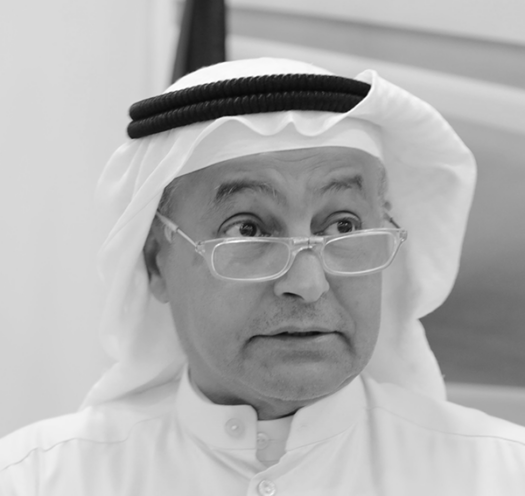

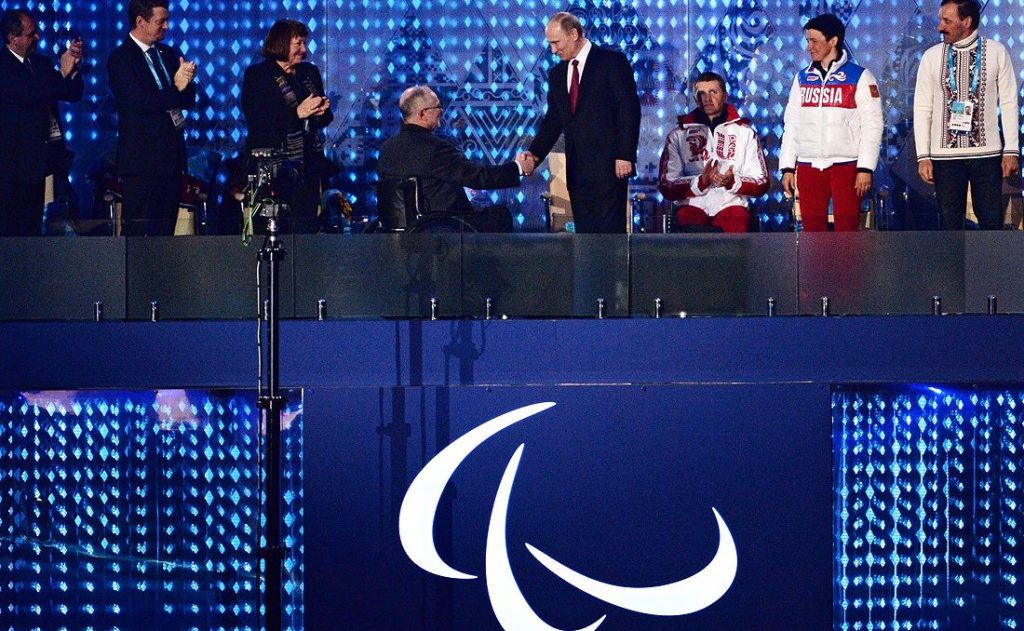
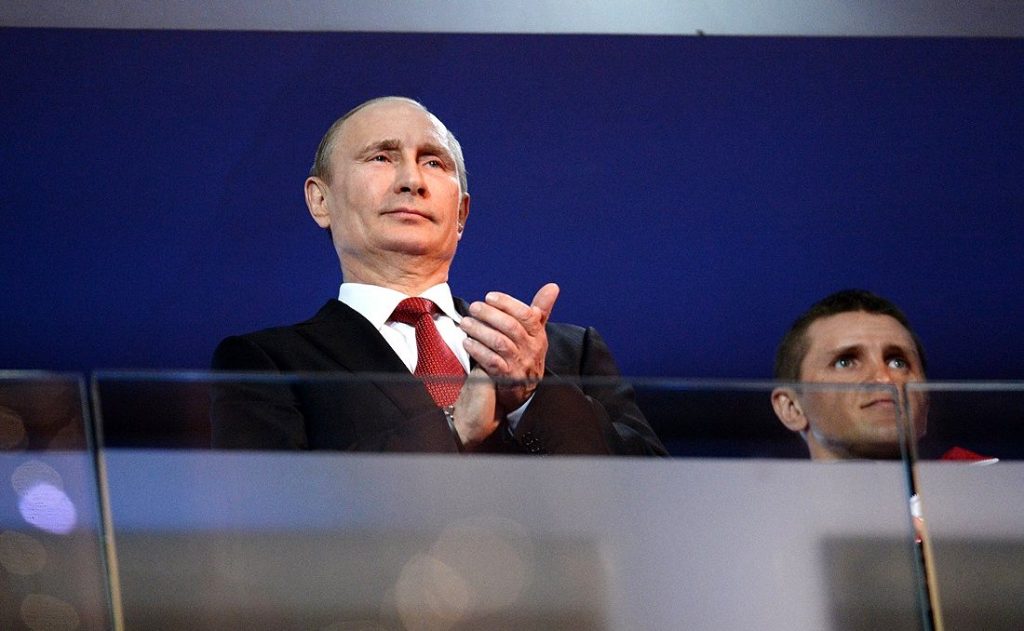
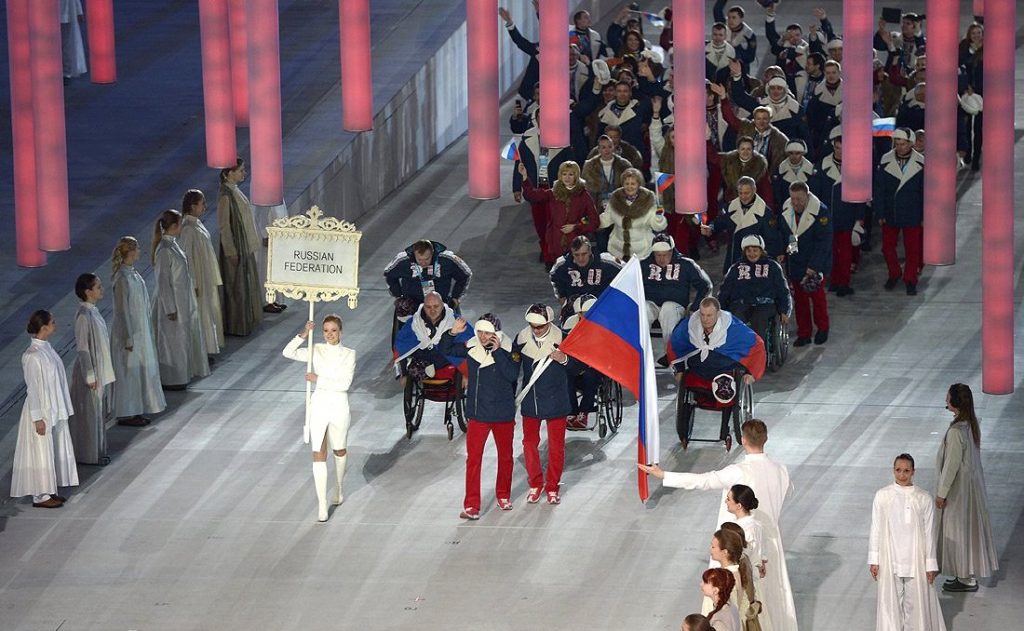
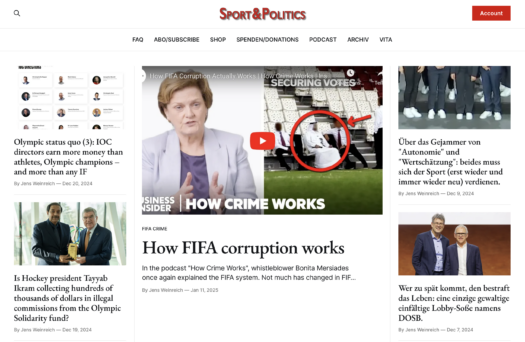
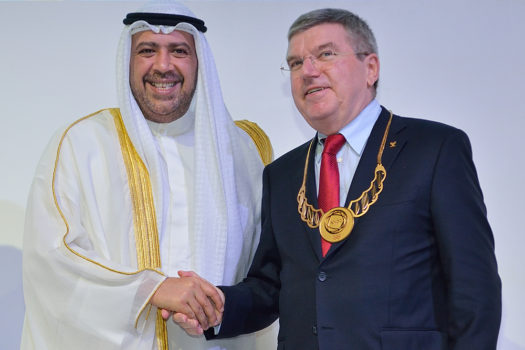
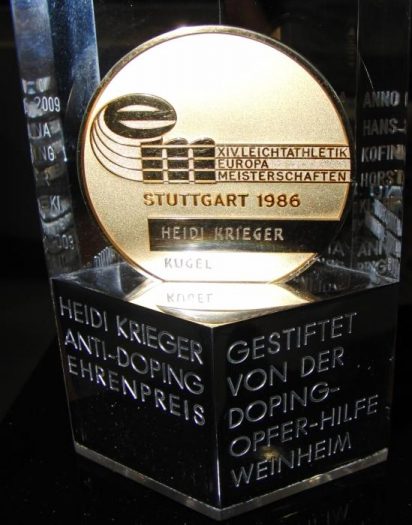
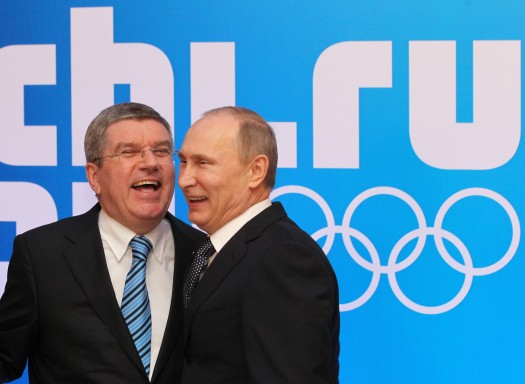
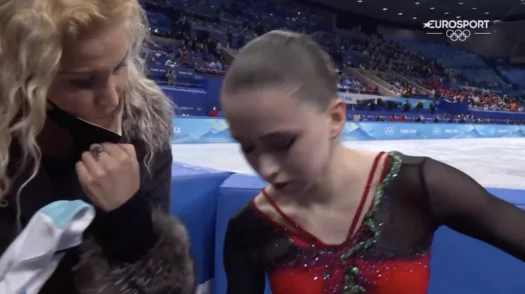
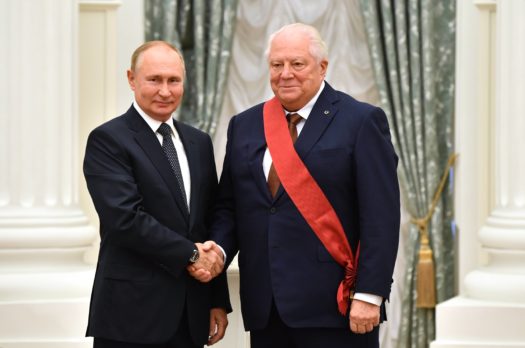
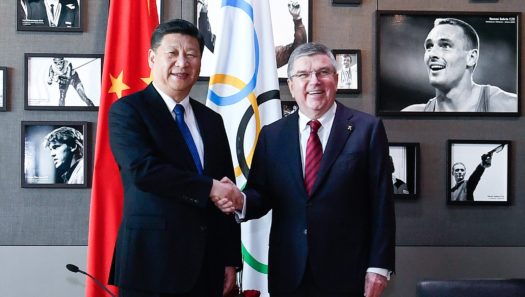
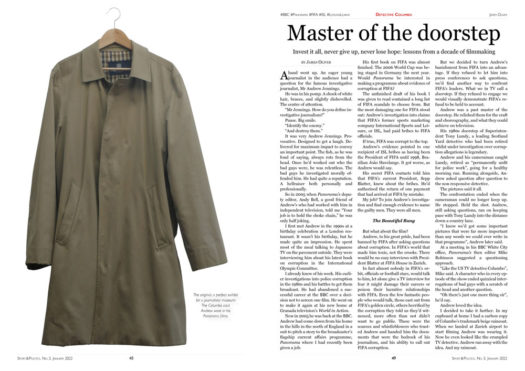
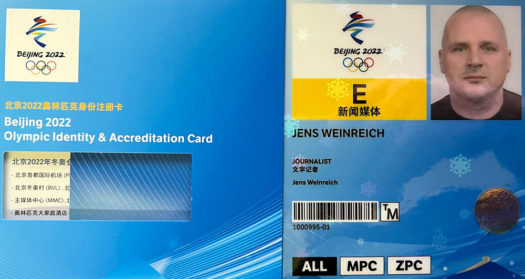
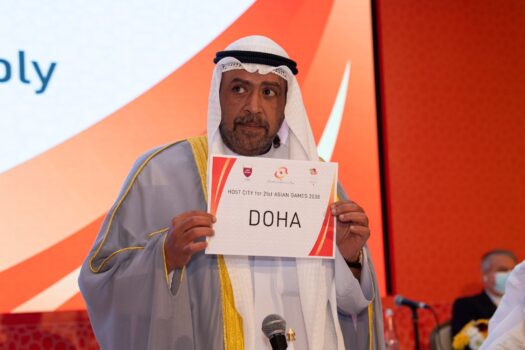
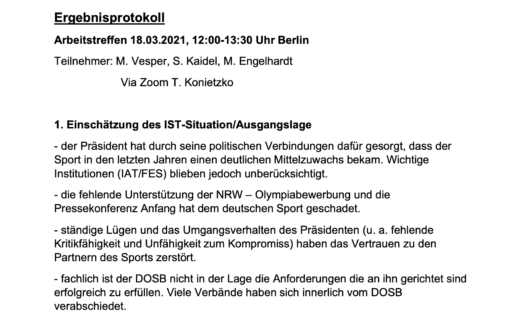
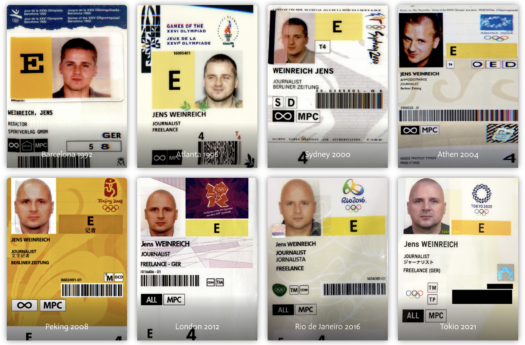
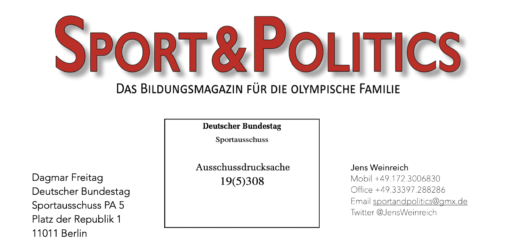
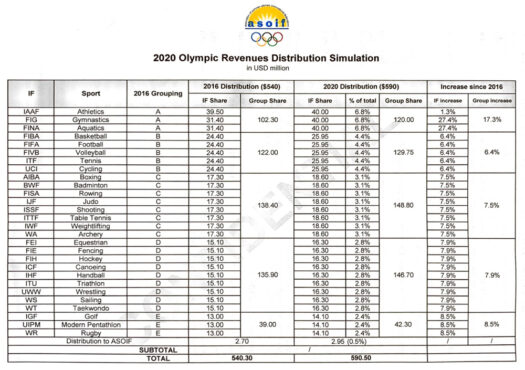
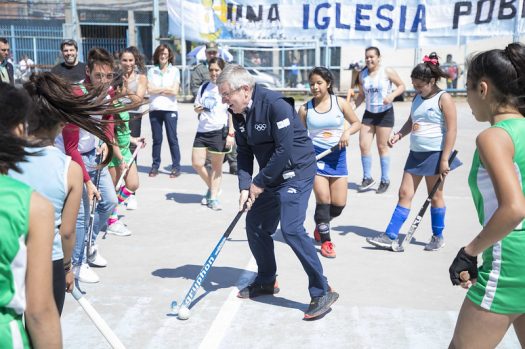
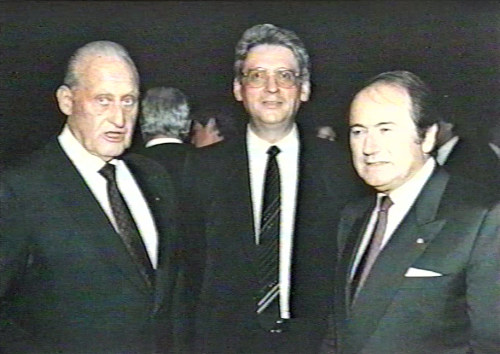
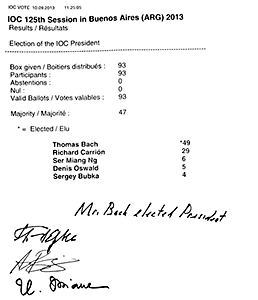
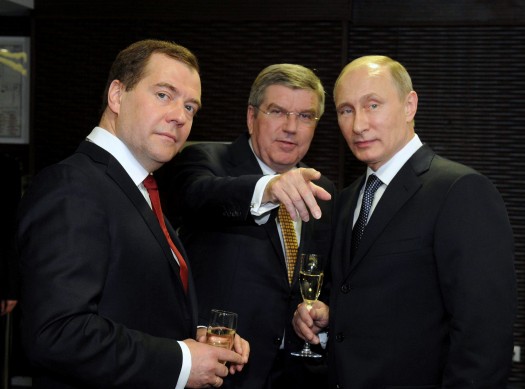
Hmm, ob es hierbei die Richtigen getroffen hat?
IOC und IPC sind Monopole und daher an kartellrechtliche Grundsätze gebunden, ebenso die NOCs und NPCs. Daher besteht keineswegs völlige Entscheidungsfreiheit, wer eingeladen wird und wer nicht. Die kann auch die Charta nicht verwähren, die insoweit unwirksam sein dürfte. Der CAS wird das freilich niemals feststellen.
Ausschluss RPC sicherlich verbandsrechtlich zulässig, so wie es auch der Ausschluss des ROC gewesen wäre. Keine Chance vor dem CAS.
Für Sportler, denen keine Beteiligung am Staatsdoping oder sonstige Verstöße nachgewiesen werden können, sehe ich aber durchaus Chancen: Vielleicht sogar vor dem CAS, vor allem aber, wenn sie einen Weg für ein zivilrechtliches Verfahren finden – zB Eilverfahren oder nachträgliche Schadensersatzklagen.
WADA: WADA Statement on IPC Decision
Knapp 2 Minuten der IPC-Pressekonferenz in einem BBC-Video…
Paul Hayward für den Telegraph: International Paralympic Committee puts Olympic chiefs to shame with blanket ban for Russia
Wow, das ist nichtmal mehr eine Ohrfeige für Bach, das ist eigentlich technisches KO. Stellt sich nur die Frage, wann er dann fällt, noch schlechter kann es für das IOC ja kaum noch laufen. Außer vielleicht, wenn jetzt russische Athleten beim Doping erwischt werden…
SWR: Behinderten-Beauftragte Bentele über Olympia ohne Doping: Wunsch nach mutigen Athleten
Hältst Du es für möglich, daß der Paralympics-Ausschluß ein Teil des Deals war (wie der Ausschluß der Vorbestraften), um die Haupt-Mannschaft zuzulassen und der breiten Öffentlichkeit trotzdem den Anschein zu geben, man habe hart durchgegriffen?
Owen Gibson im Guardian: Paralympics show way on Russian doping to shame of the IOC
Hendrik Maaßen für ndr.de: Eine paralympische Ohrfeige für Thomas Bach
gerade im Guardian gesehen: Paralympic Games: countries still waiting for vital travel grants
Und was sagt ROCOG-Sprecher Andrada zur Beruhigung der Gemüter?
dpa (22.08.): Ausschluss oder Zulassung Russlands von den Paralympics?
CAS: CAS dismisses the appeal filed by the Russian Paralympic Committee
Ein wunderbarer Schlag ins Gesicht vom UDIOCP Bach und seiner vermeintlich schwerwiegenden juristischen Bedenken bezüglich eines Russland-Banns. Wie sangen dereinst die Helden:
Oder eben im Umkehrschluss: Bach wollte eben nicht. Noch nicht einmal versuchen.
Und nun kann es sich auch ein jeder schwarz auf weiß ausdrucken, einrahmen und wahlweise über Bett oder Kamin hängen.
Reuters: Anti-U.S. mood could hurt Los Angeles in bid for Games,
Das schlimme an Paranoia ist der sich selbst verstärkende Kreislauf und das falsche Verständnis für die Strukturen in anderen Ländern.
(1) Die US-Behörden haben sich an den FIFA-Sumpf nur herangetraut, weil sie die WM 2022 nicht bekommen haben. Die US-Behörden ermitteln nur gegen russische Staatsdoper, weil man ihnen (den Rotenberg-Brüdern) den Erfolg von Sochi (extrem dicke Bankkonten) nicht gönnt.
(2) Das bekannt werden von Bereicherung und Doping beschädigt unseren Ruf. Das muss Konsequenzen haben. US-Bewerbungen haben keine Chance.
(3) US-Bundesanwälte ermitteln weiter, aber nicht deswegen. Sie ermitteln weil ihre Leiter in der Regel politische Ambitionen haben und es sich im Lebenslauf nie gut macht, vor der Mafia gekuscht zu haben.
(4) Sie finden die Beweise, ohne die US-Jurisprudenz groß zu überdehnen, weil die Mafia natürlich das US-Rechts- und Bankensystem nutzt. Neustart bei (1).
Und hier der Link: http://www.reuters.com/article/us-olympics-la-idUSKCN10X10T
@ duesseldorfer
Fantastisch zusammengefasst. Werde die Paranoia mal in den neuen Eintrag zum CAS-Entscheid übernehmen.
Pingback: Was vom Tage übrig bleibt (98): IOC-Ticketdealer Hickey, Kuwait, IPC, CAS-Urteil und Bundesgericht, NADA-Positionspapier • Sport and Politics
Pingback: CAS bestätigt die Suspendierung Russlands für die Paralympics • Sport and Politics
Pingback: live aus Kopenhagen, Kampf um die UEFA-Präsidentschaft: Aleksander Ceferin vs Michael van Praag • Sport and Politics
Sir Philip Craven im FAZ-Interview: „Die Paralympics bewirken einen Wandel“
Pingback: Wladimir Putin: “the Olympic spirit have been insolently trampled underfoot by politics” • Sport and Politics
Hendrik Wieduwilt in der FAZ: Russische Paralympics-Athleten klagen in Karlsruhe
IPC: The IPC informs the Russian Paralympic Committee of reinstatement criteria